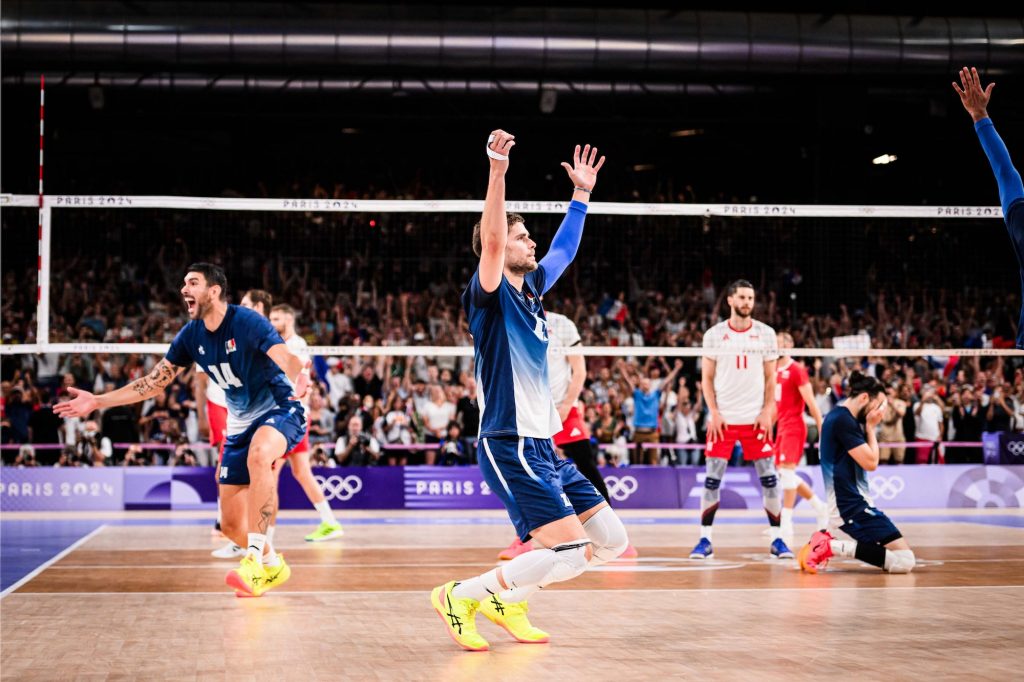
After the recently concluded Paris 2024 Olympic Games, France has once again proven that it is not just a force in world volleyball, but possibly the strongest nation in men’s volleyball today. While the eyes of the world focused on their senior team’s triumphs, which included winning the 2024 Volleyball Nations League (VNL) and securing Olympic gold, many might have overlooked the depth of France’s success across all age groups. This year, French teams have also claimed European titles in the U22, U20, and U18 categories, solidifying their position as a dominant powerhouse in men’s volleyball.
France’s male volleyballers aren’t the only ones making waves. The French women’s national team has undergone a remarkable transformation in recent years. In just five years, they have progressed from a middle-tier European team to breaking into the global elite. Currently ranked 19th in the FIVB Women’s Volleyball World Rankings, the French women have secured a place in the prestigious VNL and delivered strong performances in the 2024 Olympics. Their qualification for the FIVB Women’s World Championship 2025 is another milestone that highlights the rapid strides they have made.
A Strategic Approach to Long-Term Success
So, what’s the secret behind France’s volleyball success story? It all comes down to long-term planning, heavy investment in youth development, and strong governmental support for sports. France has invested in building a robust pipeline of talent through its comprehensive development programs for athletes, and coaches as well. This framework has enabled France to consistently nurture young talent, which in turn has led to its continuous success on the global stage.
The backbone of the French men’s volleyball achievements has been its French coaching staff. Philippe Blain, who long led the men’s team, was succeeded by Laurent Tillie, under whom France achieved further success. Recently, Italian coach Andrea Giani has added even more accolades to France’s trophy cabinet.
On the women’s side, Belgium’s Emile Rousseaux has played a pivotal role in the rise of the French women’s team. Under his guidance, the team has made great strides in quality, creating a foundation for future success.
The Role of Club Competitions and International Inspiration
France’s club-level volleyball competitions also contribute significantly to the development of its players. A well-structured league system ensures that potential stars get the opportunity to hone their skills in competitive environments.
In addition to France, Italy, Poland and Japan stand as prime examples of how systematic, long-term development projects can lead to sustained success in volleyball. Italy has been a global leader for years, while Japan’s methodical approach has brought both its men’s and women’s teams back to the forefront of international volleyball. We must not forget Poland, which has become synonymous with outstanding sports achievements and results, as well as the consistent top-tier organization of volleyball competitions. Their men’s and women’s volleyball leagues are at an exceptional level, and their national teams continue to reach the pinnacle of sporting excellence. Volleyball in Poland is now more than just a sport; it’s a movement, and we can only hope that it continues to thrive.
In recent years, Slovenia has emerged as a significant player in men’s volleyball. Despite being a small nation, their men’s team has been in contention for top continental and global titles for over a decade. Their women’s team is also starting to make waves, having qualified for the 2025 World Championship for the first time. With several standout young players, including Pucelj and Siftar, Slovenia is poised to continue its ascent in international volleyball.
Future Trends and Challenges
As the global volleyball landscape evolves, it’s clear that the successes of countries like France, Italy, Poland, Japan, and Slovenia should serve as an inspiration to other nations. Their carefully crafted approaches to athlete development, combined with sustained government and institutional support, offer valuable lessons for any country aiming to strengthen its volleyball presence.
While Brazil has experienced a slight decline, and Korea and Iran face challenges, there’s hope that renewed focus and international expertise will bring them back to the top. Brazil, long a powerhouse in both men’s and women’s volleyball, appears to be in a transitional phase, while Korea’s struggles are more significant. Still, with the right investments and strategic approaches, these nations could rebound in the coming years.
Türkiye has consistently excelled in women’s volleyball, with a systematic approach at both club and national levels. However, their men’s side has struggled to find similar success, marked by inconsistent direction.
As the professional volleyball league in the USA takes shape, it’s hoped that this new development will further boost the sport’s global appeal. The future of volleyball is bright, with a new generation of talent on the rise, and it will be fascinating to watch as these young stars continue to shape the sport’s future.
The key takeaway? Successful volleyball development is no accident—it’s a blend of long-term planning, consistent support, and the nurturing of both talent and coaches alike. With France, Poland, Italy, Japan, Slovenia, and others showing the way, it’s only a matter of time before we see even more nations join the volleyball elite.